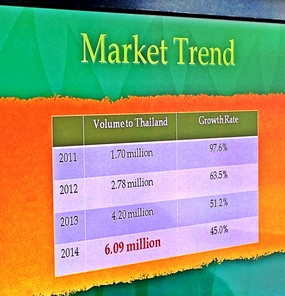Shanghai, China – It has taken almost no time but it was anticipated by many – China has become the number one source market for many Southeast Asian countries, including Thailand.
In my capacity as a former hotelier; a new travel agent; a journalist and National President of Skål International – Thailand, I had the opportunity to visit Shanghai and Nanjing to experience first hand China’s phenomenal growth in outbound tourism.
Our group of senior tourism professionals made visits to TG (THAI) and TAT. Our first stop, so we were keen and hungry to learn. There followed an excellent briefing and overview of the market by TAT at their busy downtown location, where we learnt that Chinese outbound travel to Thailand is set to reach 6.09 million in 2014 – doubling since 2012. [2011 +97.6%; 2012 +63.5%; 2013 +51.2%; 2014 +45.0%]

We also learnt that there is strong growth by Chinese tourists to all short haul destinations which will reach 97.3 million by 2014 (+12.5%) and long haul 9.90 million (+16.47%).
As part of the road show sales calls to agents, wholesalers and OTA’s were organised and the following day we participated in tabletop discussions which was organised at the Jin Jiang Tower hotel. Presentations and lunch to approx 100 Chinese outbound agents.
Commenting on the road show, Chaiwat Charoensuk, Director/Chief Representative at the Tourism Authority of Thailand’s Shanghai office, when I asked “was he pleased with the event?” said, “We are very grateful for the private sector support of this very well organised road show and the way it has been arranged. The presentations and tabletop discussions with agents are very professional and informative so TAT invited agents from Shanghai, Guangzhou and Nanjing to attend today. Sellers from Thailand had an opportunity to meet buyers from China. It is really great.”
Commenting on the tremendous growth of Chinese visitors to Thailand he said, “We have three offices in China and we all work together to market Thailand effectively … it is now easier to attract more visitors and all three offices in China work hard to promote Thailand … we were very successful last year.”
In discussing the challenges for the Chinese market Chaiwat said, “We cannot solve Thailand’s image, which is seen as a cheap destination, as the Chinese agents are reluctant to sell hotels higher than RMB 4,000 (approx THB 850 or US$28). We try to explain that if they pay higher rates they get better quality, value and better service, but this will take time because China has 1.4 billion population and only a small percentage are travelling to Thailand.”
“More people are booking through OTA’s and are looking at other people’s recommendations online. The trend luckily is moving more towards luxury and thank you to the private sector again to identify the good quality products such as five and six star properties and help educate the agents. The problem, however, is that the majority of Chinese agents only sell three and four star hotels,” said the TAT director.
The Shanghai road show was organized by Malaysian agent See Toh Holidays in conjunction with TAT and a VIP group of hotel owners from Phuket, Krabi and Samui. I asked MD See Toh how he felt the first road show to Shanghai had performed: “Actually we have had many road shows in different countries but in China this is our first and we chose Shanghai because it is quite civilised with good spending due to high disposable incomes. With regard to the results for today, it is very good and the attendance is quite satisfactory.
“The feedback on the way we are asking questions is all very positive and constructive. I think the potential is very big. Actually, we recently handled a fam trip to Thailand from Beijing and Shanghai prior to the road show and the feedback was shopping is not so important. However, because China is a very busy place with very little space, we found that room to relax is what is important to the Chinese market. They are focussed on the living standard and lifestyle and they like quiet and comfortable, because in Shanghai now it is too crowded. Frankly I was surprised that they are not like normal Asians – they don’t just like shopping but are very interested in the type of hotel with space with a high quality of service,” See Toh concluded.
We found that OTA business in China is very sophisticated. Companies like Ctrip, who are involved in many segments of the tourism market, whose HQ are based in Shanghai, employ 4,000 people in just one centre and generate 2,000,000 room nights each month. And this is growing.
Commenting on this growth Helin Li, senior procurement manager for Ctrip based in Shanghai, had the following to say, “Ctrip it is now the biggest outbound travel agent in China, our company has been operating only for 12 years but now employs 15,000 staff. We are finding more people are making their travel arrangements via smartphones and we have a number of apps to help us with this business. We send over 10,000 people per month to Thailand. In these last two years our Thailand business has increased a lot, not just hotel bookings but also leisure tours. We have over 100 groups a month going to Thailand and Thailand is our number one best-selling destination,” she said.
Commenting about the number of airline seats available on flights from China to Thailand, Helen Li had this to say, “Capacity is a little problem but now Thai Airways are planning to increase flights daily to different destinations, not only to Bangkok but also to Phuket and Krabi. Now we have charter flights to Chiang Mai so I definitely think this will attract more Chinese to travel to Thailand.”




